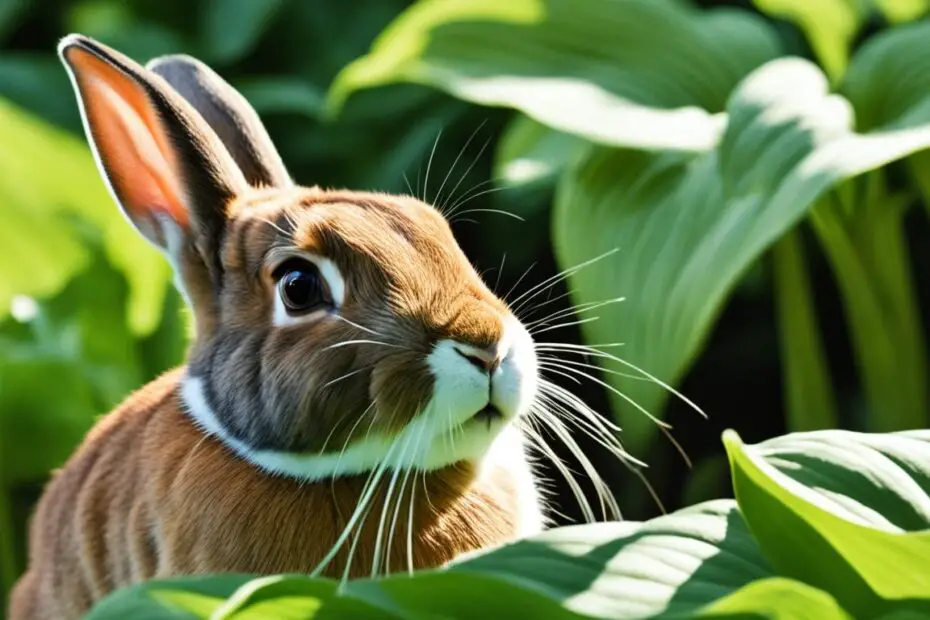Welcome to our guide on protecting your beloved hostas from rabbits! If you’re a gardener, you may have wondered, “Do rabbits eat hostas?” The answer is, unfortunately, yes. Rabbits have a penchant for nibbling on the stems and new shoots of this popular garden plant. However, there are several measures you can take to safeguard your hostas and keep those furry intruders at bay.
Key Takeaways:
- Rabbits can indeed eat hostas, especially the stems and new shoots.
- Protecting hostas from rabbits involves installing a metal fence or using plant cages.
- Surrounding hostas with geraniums or marigolds and using scent deterrents like tabasco or crushed red pepper can help keep rabbits away.
- Deer can also be a threat to hostas, so consider additional protection measures if necessary.
- Prevention is key when it comes to maintaining the beauty and health of your hostas.
The Charms of Hostas
Hostas are popular garden plants known for their beautiful foliage. They come in a variety of species and varieties, offering different colors, sizes, and shapes. While hostas are not typically a part of a rabbit’s natural diet, rabbits will eat them if they are hungry enough. It’s important to understand the appeal of hostas to rabbits and take steps to protect them from rabbit damage.
Hostas have long been cherished by garden enthusiasts for their lush and vibrant leaves. With an extensive range of species and varieties to choose from, these plants offer gardeners a myriad of options to enhance their outdoor spaces. Whether you prefer the elegant and classic look of the ‘Patriot’ hosta or the striking blue hues of the ‘Halcyon’ variety, there is a hosta to suit every taste and garden style.
Although hostas are not typically a primary food source for rabbits, these furry nibblers may devour them if they are hungry enough. The lush and succulent foliage of hostas can be highly enticing to rabbits, especially when other vegetation is scarce. Therefore, it’s crucial to take proactive measures to protect your hostas from rabbit damage.
One way to safeguard your hostas is by implementing physical barriers such as fences or plant cages. By installing a 3-foot metal fence around your hostas or using plant cages with small openings, you can create a barrier that prevents rabbits from reaching and devouring your precious plants.
Additionally, you can strategically companion plant your hostas with rabbit-deterrent flowers such as geraniums or marigolds. These flowers emit strong odors that rabbits find unappealing, helping to keep the furry intruders at bay. Alternatively, you can try sprinkling tabasco or crushed red pepper around your hostas, as rabbits generally dislike spicy scents.
To provide an extra layer of protection, you can also create a natural rabbit repellent by mixing rotten eggs and tabasco sauce. The strong smell of this concoction can help deter rabbits from approaching your hostas, preventing them from becoming a tempting feast.
Remember, while rabbits may find hostas appealing, it’s essential to ensure their safety and wellbeing. By taking the necessary precautions, you can enjoy the beauty of hostas in your garden without worrying about rabbit damage.
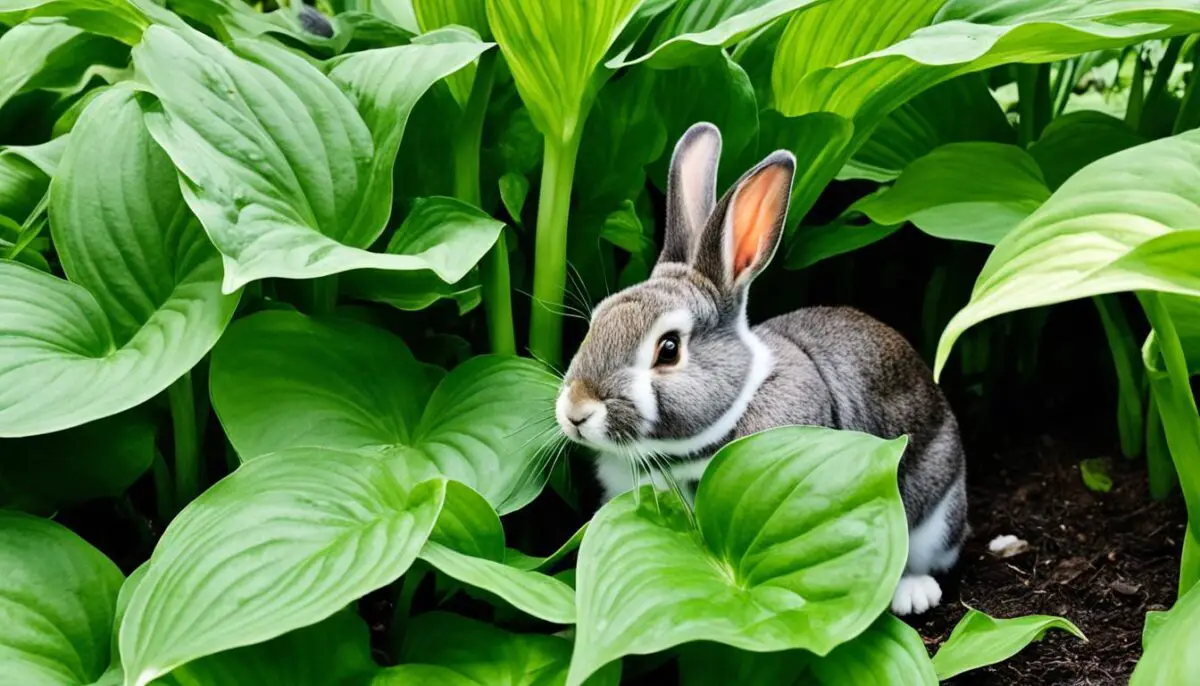
Protecting Hostas from Rabbits
Rabbits have specific feeding habits when it comes to hostas. While they tend to target the tips of hosta shoots, they can eat any part of the plant if they are hungry. To safeguard your hostas from rabbit damage, here are some effective protective measures:
- Install a 3-foot metal fence: Surrounding your hostas with a tall metal fence can create a physical barrier that prevents rabbits from accessing the plants. Make sure the fence extends at least 6 inches below ground level to deter burrowing.
- Use plant cages with small openings: Plant cages with narrow gaps or mesh can be placed around individual hostas to create a barrier that rabbits cannot squeeze through. This method allows the foliage to grow freely while providing protection.
- Deter rabbits with foul-smelling plants: Surrounding your hostas with geraniums or marigolds can help discourage rabbits from approaching. The strong scent of these flowers can repel rabbits and keep them away from your precious plants.
- Utilize natural repellents: Sprinkling tabasco or crushed red pepper around your hostas can deter rabbits due to their sensitive noses. Additionally, you can create a mixture of rotten eggs and tabasco, applying it as a spray around your plants. The unpleasant smell and taste will keep rabbits at bay.
Finding the right combination of methods that work for your garden is crucial. Remember to monitor the effectiveness of your chosen protective measures and adjust as needed. With proper precautions, you can enjoy beautiful, undamaged hostas in your garden.
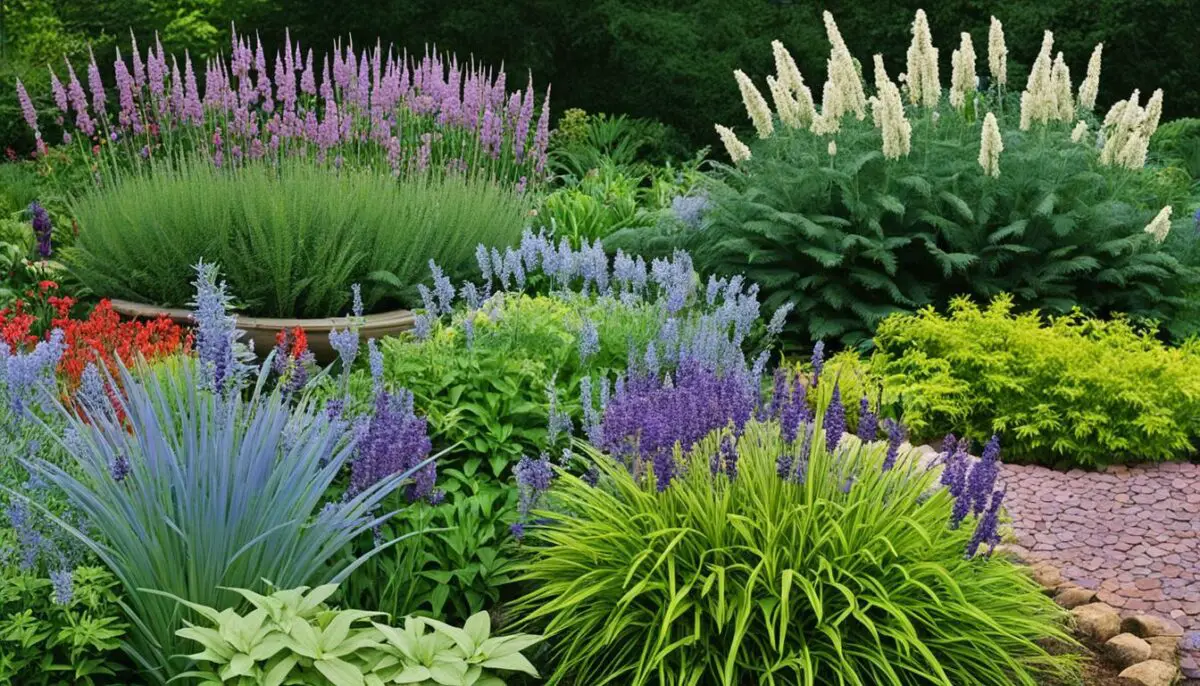
Creating a Deer-Resistant Environment
When it comes to deterring deer from your garden, it’s essential to make your landscape less attractive to these animals. Here are some strategies to consider:
- Choose deer-resistant plants: Incorporating deer-resistant plants alongside your hostas can help reduce the chances of deer feasting on your garden. Examples of such plants include daffodils, lavender, and yarrow.
- Use repellents: Applying commercially available deer repellents can help keep these animals away from your hostas. Look for products that contain ingredients like garlic, pepper, or rotten eggs.
- Create physical barriers: Installing deer-proof fencing or barriers can create a physical deterrent for deer, preventing them from accessing your garden and damaging your hostas.
Understanding Deer Behavior
“Deer have a keen sense of smell and are attracted to plants with soft foliage. By incorporating deer-resistant plants and implementing deterrent methods, you can create an environment that is less appealing to these animals.” – Rebecca Green, Master Gardener
Deer are creatures of habit and tend to follow regular feeding patterns. By understanding their behavior, you can better anticipate when your hostas may be at risk.
- Identify deer pathways: Look for signs of deer activity in your garden, such as trampled vegetation or tracks. These areas can indicate the paths that deer frequently travel.
- Time your hosta plantings: Deer are less likely to be attracted to younger, smaller hosta plants. Planting hostas in the spring or fall when they are still establishing can help minimize the risk of deer damage.
By implementing these strategies and understanding deer behavior, you can effectively safeguard your hostas from these graceful yet voracious garden visitors.
Tips from Viewers
Many gardeners have shared their tried and tested tips for protecting plants, including hostas, from rabbits and other animals. Here are some of their recommendations:
1. Irish Spring Soap Shavings
Protecting plants with the power of scent.
Some viewers have found success in deterring rabbits by placing shavings of Irish Spring soap around their garden. The strong smell is believed to repel rabbits and keep them away from hostas and other plants.
2. Deer and Rabbit Spray
A reliable defense against plant-eating pests.
Another popular suggestion is to use deer and rabbit spray. These sprays contain natural ingredients that rabbits find unappetizing, therefore discouraging them from feeding on hostas and other vegetation.
3. Cayenne or Crushed Red Pepper
Adding a spicy deterrent to protect plants.
For those seeking a natural solution, viewers recommend sprinkling cayenne pepper or crushed red pepper around the plants. The strong spicy scent acts as a deterrent, making the hostas less appealing to rabbits.
4. Dried Blood
Natural fertilizer with a repelling effect.
Some gardeners have found that spreading dried blood around their hostas not only acts as a plant fertilizer but also deters rabbits. The scent of blood suggests the presence of a predator, discouraging rabbits from approaching the area.
5. Fencing or Chicken Wire
Creating a physical barrier.
Viewers have also suggested using fencing or chicken wire to protect hostas from rabbits. By creating a physical barrier, rabbits are unable to access the plants, ensuring their safety.
“I’ve tried different methods, but using chicken wire has been the most effective in keeping rabbits away from my hostas. They can’t get through and my plants are thriving!” – Emily G.
Remember, while these tips have proven successful for many, it’s important to research and test these methods to determine their effectiveness in your specific garden environment. Keeping in mind the feeding habits of rabbits and the importance of protecting plants, finding the right strategies can help ensure the well-being of your hostas and other cherished garden plants.
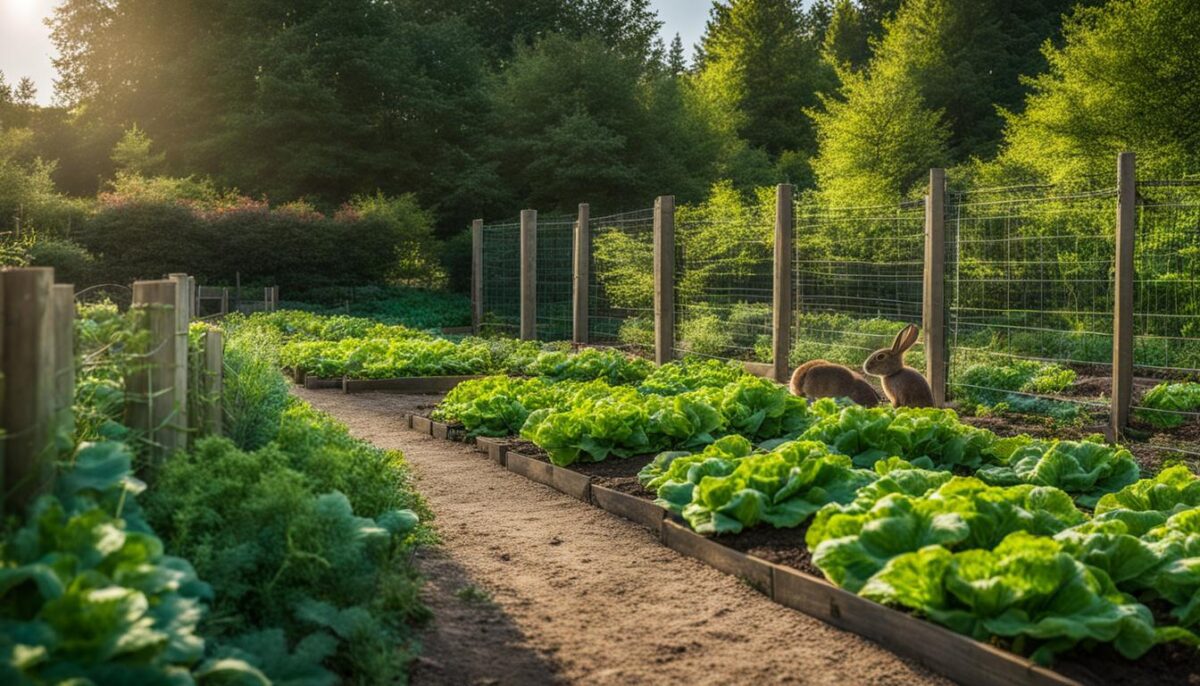
| Tip | Description |
|---|---|
| Irish Spring Soap Shavings | Deter rabbits with the strong scent of Irish Spring soap. |
| Deer and Rabbit Spray | Repel rabbits and other pests with specialized sprays. |
| Cayenne or Crushed Red Pepper | Add a spicy deterrent by sprinkling cayenne or crushed red pepper. |
| Dried Blood | Fertilize while repelling rabbits with dried blood. |
| Fencing or Chicken Wire | Build a physical barrier with fencing or chicken wire. |
Taking Care of Hostas
Hostas are beautiful garden plants that are known for their lush foliage and adaptability to different light conditions. Caring for hostas is relatively easy, but it’s important to understand their characteristics and take steps to protect them from potential threats, such as rabbits and other animals.
Here are some key aspects of hosta plant care:
1. Light Requirements
Hostas can thrive in both full shade and part shade conditions. However, different varieties may have specific light preferences, so it’s important to check the specific requirements of the hosta cultivars you have in your garden. Generally, hostas with lighter-colored foliage prefer more shade, while those with darker foliage can tolerate more sun.
2. Soil and Watering
Hostas prefer moist, well-draining soil that is rich in organic matter. Regular watering is essential, especially during dry spells, to ensure the plants have enough moisture. It’s recommended to water deeply but less frequently to encourage deep root growth.
3. Mulching
Applying a layer of organic mulch around the base of hostas can help retain soil moisture, suppress weeds, and regulate soil temperature. Mulching also adds organic matter to the soil as it breaks down over time, improving its fertility and structure.
4. Division and Propagation
Hostas can be easily divided to propagate new plants. Dividing hostas every few years helps maintain their vigor and prevents overcrowding. Spring or early fall is the best time to divide hostas when the weather is cool and the plants are dormant or in active growth.
5. Pest and Disease Management
While hostas are generally resistant to pests and diseases, they can be susceptible to slug and snail damage. Applying organic slug control measures, such as beer traps or diatomaceous earth, can help protect hostas from these common garden pests.
“Hostas are incredibly versatile and forgiving plants that can adapt to various growing conditions. With minimal care and attention, they can thrive and enhance the beauty of any garden.” – Jane Smith, Master Gardener
Hostas are resilient plants, but they can be vulnerable to damage caused by rabbits and other animals. It’s important to take preventive measures, such as installing fences, using plant cages, or incorporating deterrents like tabasco or crushed red pepper, to protect hostas from potential harm.
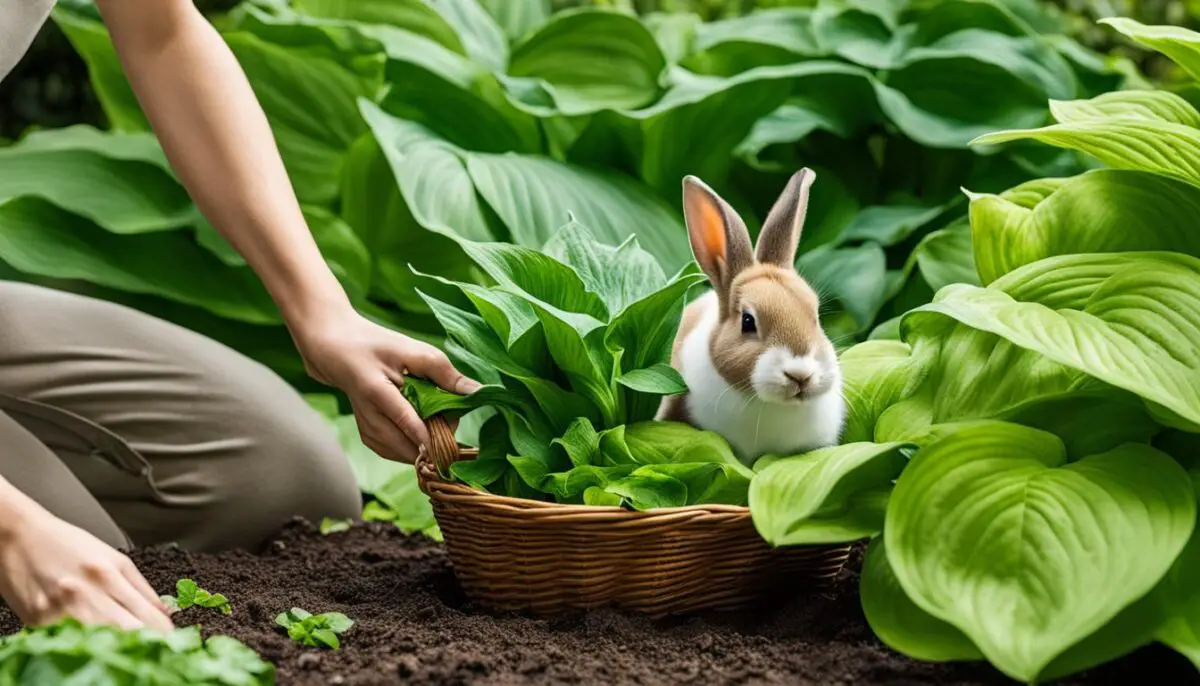
The Importance of Prevention
When it comes to protecting your hostas from rabbits and other animals, prevention is crucial. By taking proactive measures, you can minimize the risk of damage and ensure the healthy growth and appearance of your plants.
Here are some effective methods for protecting plants from rabbits:
- Installing Fences: One of the most reliable ways to prevent rabbits from accessing your hostas is to install fences around the garden. A 3-foot metal fence is recommended to deter rabbits from hopping into your precious plants.
- Using Plant Cages: Plant cages with small openings can be an effective barrier against rabbits. They prevent rabbits from reaching the delicate hosta shoots, thus safeguarding them from being devoured.
- Employing Scent Deterrents: Rabbits have a keen sense of smell, and certain scents can repel them. Try sprinkling tabasco or crushed red pepper around your hostas to create an unpleasant environment for rabbits.
By taking action early on and implementing these prevention measures, you can create a hostile environment for rabbits and protect your hostas from their voracious appetites.
Remember, the key to successful prevention is consistency. Check your fences regularly for any gaps or weaknesses, and replenish the scent deterrents as needed to ensure ongoing protection for your precious plants.
“Prevention is better than cure when it comes to protecting your hostas from hungry rabbits.”
Methods for Protecting Hostas from Rabbits
| Methods | Description |
|---|---|
| Installing Fences | A 3-foot metal fence can effectively deter rabbits from accessing your hostas. |
| Using Plant Cages | Plant cages with small openings create a barrier that keeps rabbits away from delicate hosta shoots. |
| Employing Scent Deterrents | Scattering tabasco or crushed red pepper around hostas creates an unpleasant environment that rabbits dislike. |
Conclusion
In conclusion, while hostas are a popular choice for gardeners, they can be susceptible to damage from rabbits. These furry creatures are attracted to the lush foliage of hostas and may nibble on various parts of the plant if they are hungry. However, there are effective measures you can take to protect your hostas and maintain their beauty in your garden.
Installing fences or using plant cages with small openings can create a physical barrier that prevents rabbits from accessing your hostas. Additionally, employing scent deterrents such as tabasco or crushed red pepper, as well as a mixture of rotten eggs and tabasco, can help deter rabbits from approaching your beloved plants.
By understanding the feeding habits of rabbits and being proactive in prevention, you can ensure the safety and longevity of your hostas. With the right protection in place, you can enjoy thriving hostas in your garden without worrying about them becoming a tempting treat for hungry rabbits.
FAQ
Do rabbits eat hostas?
Yes, rabbits have a tendency to eat hostas, particularly the stems and new shoots. They may also munch on other parts of the plant if they are hungry enough.
Can rabbits eat hostas?
While hostas are not typically a part of a rabbit’s natural diet, rabbits will eat them if they are hungry enough.
How can I protect hostas from rabbits?
To protect hostas from rabbits, it’s recommended to install a 3-foot metal fence or use plant cages with small openings. Surrounding hostas with geraniums or marigolds can also deter rabbits due to their foul smell. Other options include using tabasco or crushed red pepper and a mixture of rotten eggs and tabasco.
What do rabbits eat?
Rabbits tend to feed on the tips of hosta shoots, but they can eat any part of the plant if they are hungry. Rabbits generally eat a diet consisting of grass, leafy plants, and vegetables.
Are hostas safe for rabbits?
While rabbits can eat hostas, it’s best to prevent them from doing so as hostas may not provide the necessary nutritional requirements for rabbits and could potentially cause digestive issues.
What about deer and hostas?
Deer also pose a threat to hostas, as they prefer to eat the leaves of hostas. Similar measures can be taken to protect hostas from deer, such as installing a taller fence or using scents like mothballs, Irish Spring soap, or predator urine.
Do you have any tips for protecting plants from rabbits?
Viewers have shared various tips to prevent animals from eating their plants, including using Irish Spring soap shavings, deer and rabbit spray, cayenne or crushed red pepper, and dried blood. Some have suggested using fencing or chicken wire to keep wildlife out.
How do I take care of hostas?
Hostas are generally easy to care for and can thrive in full or part shade. They are known for their ability to grow bigger and stronger each year. Adequate watering, well-drained soil, and regular fertilization can help maintain their health and growth.
Why is prevention important when it comes to protecting hostas?
Prevention is key in protecting hostas from rabbit damage. By installing fences, using plant cages, and employing scent deterrents, you can effectively prevent rabbits from eating your hostas and ensure their healthy growth and appearance.


